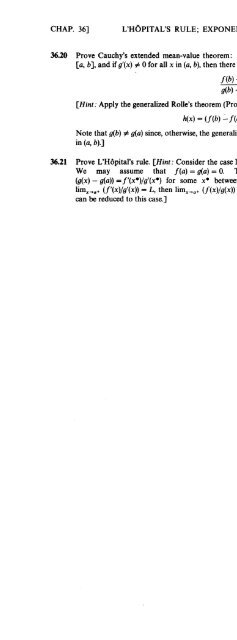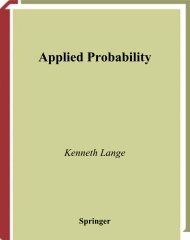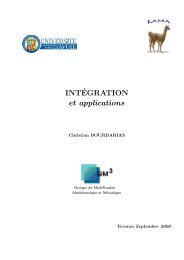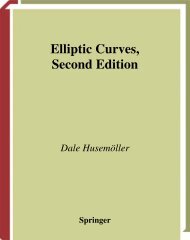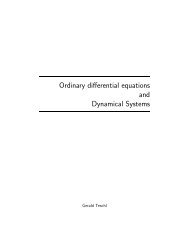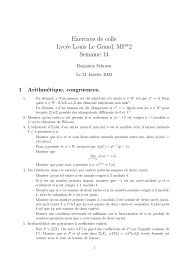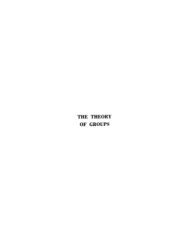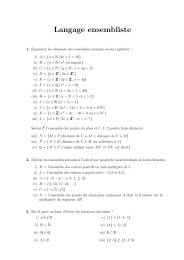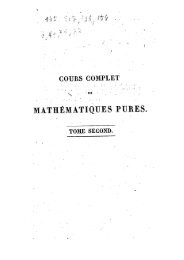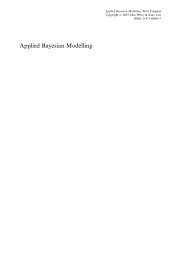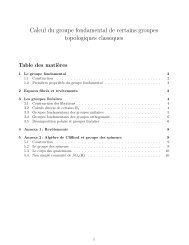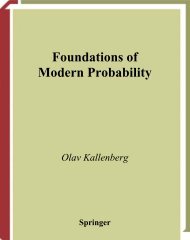- Page 4:
To the memory of my father, Joseph,
- Page 8:
This page intentionally left blank
- Page 12:
6.2 Symmetry about a Point 42Chapte
- Page 16:
Chapter 18Rectilinear Motion and In
- Page 20:
Chapter 32Applications of Integrati
- Page 24:
This page intentionally left blank
- Page 28:
2 COORDINATE SYSTEMS ON A LINE[CHAP
- Page 32:
~ ~ ~4 COORDINATE SYSTEMS ON A LINE
- Page 38:
CHAP. 11COORDINATE SYSTEMS ON A LIN
- Page 42:
CHAP. 23COORDINATE SYSTEMS IN A PLA
- Page 46:
CHAP. 21 COORDINATE SYSTEMS IN A PL
- Page 50:
CHAP. 2) COORDINATE SYSTEMS IN A PL
- Page 54:
CHAP. 31GRAPHS OF EQUATIONS15T0 0-1
- Page 58:
CHAP. 3) GRAPHS OF EQUATIONS 17on c
- Page 62:
CHAP. 31 GRAPHS OF EQUATIONS 193.5
- Page 66:
CHAP. 31 GRAPHS OF EQUATIONS 21x2 y
- Page 70:
CHAP. 31 GRAPHS OF EQUATIONS 233.16
- Page 74:
CHAP. 41 STRAIGHT LINES 25EXAMPLE I
- Page 78:
CHAP. 41STRAIGHT LINES274Ym =O m =O
- Page 82:
CHAP. 41AYSTRAIGHT LINESt’29Fig.
- Page 86:
CHAP. 41 STRAIGHT LINES 31Represent
- Page 90:
CHAP. 41 STRAIGHT LINES 33y-interce
- Page 94:
CHAP. 41STRAIGHT LINES35DAY+ Y 4YCD
- Page 98:
CHAP. 51 INTERSECTIONS OF GRAPHS 37
- Page 102:
CHAP. 51 INTERSECTIONS OF GRAPHS 39
- Page 106:
Chapter 6Symmetry6.1 SYMMETRY ABOUT
- Page 110:
CHAP. 61 SYMMETRY 43EXAMPLES(a) The
- Page 114:
CHAP. 61 SYMMETRY 45To solve (I) an
- Page 118:
CHAP. 71FUNCTIONS AND THEIR GRAPHS4
- Page 122:
CHAP. 73 FUNCTIONS AND THEIR GRAPHS
- Page 126:
CHAP. 71FUNCTIONS AND THEIR GRAPHS
- Page 130:
CHAP. 71 FUNCTIONS AND THEIR GRAPHS
- Page 134:
CHAP. 71FUNCTIONS AND THEIR GRAPHS
- Page 138:
CHAP. 71FUNCTIONS AND THEIR GRAPHSt
- Page 142:
Chapter 8Limits8.1 INTRODUCTIONTo a
- Page 146:
CHAP. 81 LIMITS 61EXAMPLElim ,/- =
- Page 150:
CHAP. 83 LIMITS 63(b) f(x + h) = 4(
- Page 154:
CHAP. 8) LIMITS 65Supplementary Pro
- Page 158:
Chapter 9Special Limits9.1 ONE-SIDE
- Page 162:
CHAP. 91 SPECIAL LIMITS 69to indica
- Page 166:
CHAP. 93 SPECIAL LIMITS 71EXAMPLESl
- Page 170:
CHAP. 91 SPECIAL LIMITS 73EXAMPLE D
- Page 174:
CHAP. 91 SPECIAL LIMITS 75lim f(x)
- Page 178:
CHAP. 91 SPECIAL LIMITS 77(b) Assum
- Page 182:
~ ~~ ~~~~~~~~~~~~~~~~~~~~CHAP. 101
- Page 186:
CHAP. 101 CONTINUITY 81Solved Probl
- Page 190:
CHAP. 101 CONTINUITY a3(a) There ar
- Page 194:
CHAP. 101 CONTINUITY 8510.12For eac
- Page 198:
h,CHAP. 11) THE SLOPE OF A TANGENT
- Page 202:
CHAP. 113THE SLOPE OF A TANGENT LIN
- Page 206:
CHAP. 113 THE SLOPE OF A TANGENT LI
- Page 210:
CHAP. 121 THE DERIVATIVE 93CoroUary
- Page 214:
h,CHAP. 121 THE DERIVATIVE 95Solved
- Page 218:
CHAP. 121 THE DERIVATIVE 9712.8(a)
- Page 222:
Chapter 13More on the Derivative13.
- Page 226:
h,~ ~~CHAP. 131 MORE ON THE DERIVAT
- Page 230:
CHAP. 13) MORE ON THE DERIVATIVE 10
- Page 234:
CHAP. 14) MAXIMUM AND MINIMUM PROBL
- Page 238:
~CHAP. 14)MAXIMUM AND MINIMUM PROBL
- Page 242:
CHAP. 141 MAXIMUM AND MINIMUM PROBL
- Page 246:
CHAP. 141 MAXIMUM AND MINIMUM PROBL
- Page 250:
~ ~ ~~CHAP. 141 MAXIMUM AND MINIMUM
- Page 254:
CHAP. 141MAXIMUM AND MINIMUM PROBLE
- Page 258:
CHAP. 151 THE CHAIN RULE 117(6) Let
- Page 262:
CHAP. 151 THE CHAIN RULE 119EXAMPLE
- Page 266:
CHAP. 151 THE CHAIN RULE 121At the
- Page 270:
CHAP. 15) THE CHAIN RULE 123Supplem
- Page 274:
CHAP. 151 THE CHAIN RULE 12515.25 P
- Page 278:
CHAP. 161IMPLICIT DIFFERENTIATION12
- Page 282:
Chapter 17The Mean-Value Theorem an
- Page 286:
CHAP. 17) THE MEAN-VALUE THEOREM AN
- Page 290:
CHAP. 173 THE MEAN-VALUE THEOREM AN
- Page 294:
h,CHAP. 171 THE MEAN-VALUE THEOREM
- Page 298:
CHAP. 181RECTILINEAR MOTION AND INS
- Page 302:
CHAP. 18) RECTILINEAR MOTION AND IN
- Page 306:
CHAP. 181 RECTILINEAR MOTION AND IN
- Page 310:
Chapter 19Instantaneous Rate of Cha
- Page 314:
CHAP. 191INSTANTANEOUS RATE OF CHAN
- Page 318:
Chapter 20Most quantities encounter
- Page 322:
CHAP. 20) RELATED RATES 149Fig. 20-
- Page 326:
CHAP. 203RELATED RATESSubstituting
- Page 330:
CHAP. 201 RELATED RATES 15320.1020.
- Page 334:
Chapter 21Approximation by Differen
- Page 338:
CHAP. 211APPROXIMATION BY DIFFERENT
- Page 342:
CHAP. 211 APPROXIMATION BY DIFFEREN
- Page 346:
Chapter 22Higher-Order DerivativesT
- Page 350:
CHAP. 221HIGHER-ORDER DERIVATIVES16
- Page 354:
CHAP. 221 HIGHER-ORDER DERIVATIVES
- Page 358:
Chapter 23Applications of the Secon
- Page 362:
CHAP. 231 THE SECOND DERIVATIVE AND
- Page 366:
CHAP. 231THE SECOND DERIVATIVE AND
- Page 370:
CHAP. 231 THE SECOND DERIVATIVE AND
- Page 374:
CHAP. 231THE SECOND DERIVATIVE AND
- Page 378:
h,h,CHAP. 23) THE SECOND DERIVATIVE
- Page 382:
Chapter 24More Maximum and Minimum
- Page 386:
CHAP. 241 MORE MAXIMUM AND MINIMUM
- Page 390:
CHAP. 241MORE MAXIMUM AND MINIMUM P
- Page 394:
Chapter 25Angle Measure25.1 ARC LEN
- Page 398:
ICHAP. 2510 LANGLE MEASURE 187Ao*T*
- Page 402:
CHAP. 251 ANGLE MEASURE 189(b) 390"
- Page 406:
CHAP. 261 SINE AND COSINE FUNCTIONS
- Page 410:
CHAP. 261 SINE AND COSINE FUNCTIONS
- Page 414:
CHAP. 26) SINE AND COSINE FUNCTIONS
- Page 418:
CHAP. 26) SINE AND COSINE FUNCTIONS
- Page 422:
CHAP. 261 SINE AND COSINE FUNCTIONS
- Page 426:
CHAP. 261 SINE AND COSINE FUNCTIONS
- Page 430:
CHAP. 271 GRAPHS AND DERIVATIVES OF
- Page 434:
CHAP. 271GRAPHS AND DERIVATIVES OF
- Page 438:
CHAP. 273 GRAPHS AND DERIVATIVES OF
- Page 442:
CHAP. 271 GRAPHS AND DERIVATIVES OF
- Page 446:
CHAP. 271 GRAPHS AND DERIVATIVES OF
- Page 450:
CHAP. 27) GRAPHS AND DERIVATIVES OF
- Page 454:
CHAP. 281 THE TANGENT AND OTHER TRI
- Page 458:
CHAP. 281THE TANGENT AND OTHER TRIG
- Page 462:
CHAP. 281 THE TANGENT AND OTHER TRI
- Page 466:
Chapter 29Antiderivatives29.1 DEFIN
- Page 470:
CHAP. 291 ANTIDERIVATIVES 223EXAMPL
- Page 474:
CHAP. 291 ANTIDERIVATIVES 225(a) No
- Page 478:
CHAP. 29) ANTIDERIVATIVES 221Supple
- Page 482:
Chapter 30The Definite Integral30.1
- Page 486:
CHAP. 301 THE DEFINITE INTEGRAL 23
- Page 490:
CHAP. 301 THE DEFINITE INTEGRAL 233
- Page 494:
CHAP. 30) THE DEFINITE INTEGRAL 235
- Page 498:
CHAP. 301 THE DEFINITE INTEGRAL 237
- Page 502:
CHAP. 31) THE FUNDAMENTAL THEOREM O
- Page 506:
CHAP. 311 THE FUNDAMENTAL THEOREM O
- Page 510:
CHAP. 311 THE FUNDAMENTAL THEOREM O
- Page 514:
CHAP. 311 THE FUNDAMENTAL THEOREM O
- Page 518:
CHAP. 311 THE FUNDAMENTAL THEOREM O
- Page 522:
Chapter 32AppClcatlons of Integrati
- Page 526:
CHAP. 321 APPLICATIONS OF INTEGRATI
- Page 530:
CHAP. 321 APPLICATIONS OF INTEGRATI
- Page 534:
CHAP. 321 APPLICATIONS OF INTEGRATI
- Page 538:
Chapter 33Applications of Integrati
- Page 542:
CHAP. 331 APPLICATIONS OF INTEGRATI
- Page 546:
CHAP. 331 APPLICATIONS OF INfEGRATl
- Page 550:
CHAP. 331 APPLICATIONS OF INTEGRATI
- Page 554: CHAP. 33) APPLICATIONS OF INTEGRATI
- Page 558: CHAP. 33) APPLICATIONS OF INTEGRATI
- Page 562: CHAP. 341 THE NATURAL LOGARITHM 269
- Page 566: CHAP. 343 THE NATURAL LOGARITHM 27
- Page 570: CHAP. 341 THE I~ATURAL LOGARITHM 27
- Page 574: Chapter 35Exponential Functions35.1
- Page 578: CHAP. 351 EXPONENTIAL FUNCTIONS 277
- Page 582: CHAP. 351 EXPONENTIAL FUNCTIONS 279
- Page 586: CHAP. 351 EXPONENTIAL FUNCTIONS 28
- Page 590: CHAP. 351 EXPONENTIAL FUNCTIONS 283
- Page 594: CHAP. 361 L'HOPITAL'S RULE; EXPONEN
- Page 598: CHAP. 363 L'H~PITAL'S RULE; EXPONEN
- Page 602: CHAP. 361 L'HOPITAL'S RULE; EXPONEN
- Page 608: ~~~~~~~~ ~ ~~~ ~ ~ ~ ~ ~ ~ ~Chapter
- Page 612: 294 INVERSE TRIGONOMETRIC FUNCTIONS
- Page 616: 296 INVERSE TRIGONOMETRIC FUNCTIONS
- Page 620: 298 INVERSE TRIGONOMETRIC FUNCTIONS
- Page 624: 300 INVERSE TRIGONOMETRIC FUNCTIONS
- Page 628: 302 INVERSE TRIGONOMETRIC FUNCTIONS
- Page 632: above304 INVERSE TRIGONOMETRIC FUNC
- Page 636: ~ du=dx306 INTEGRATION BY PARTS [CH
- Page 640: 308 INTEGRATION BY PARTS[CHAP. 3838
- Page 644: 3 10INTEGRATION BY PARTS[CHAP. 38Su
- Page 648: 312 TRIGONOMETRIC INTEGRANDS AND TR
- Page 652: 314 TRIGONOMETRIC INTEGRANDS AND TR
- Page 656:
316 TRIGONOMETRIC INTEGRANDS AND TR
- Page 660:
318 TRIGONOMETRIC INTEGRANDS AND TR
- Page 664:
Chapter 40Integration of Rational F
- Page 668:
322 THE METHOD OF PARTIAL FRACTIONS
- Page 672:
324 THE METHOD OF PARTIAL FRACTIONS
- Page 676:
326 THE METHOD OF PARTIAL FRACTIONS
- Page 680:
328 THE METHOD OF PARTIAL FRACTIONS
- Page 684:
Appendix BBasic Integration Formula
- Page 688:
0"1"2"3"4"5"6"7"8"9"10"11"12"13"14"
- Page 692:
Appendix F-X0.000.050.100.150.200.2
- Page 696:
336 ANSWERS. TO SUPPLEMENTARY PROBL
- Page 700:
338ANSWERS TO SUPPLEMENTARY PROBLEM
- Page 704:
340 ANSWERS TO SUPPLEMENTARY PROBLE
- Page 708:
342 ANSWERS TO SUPPLEMENTARY PROBLE
- Page 712:
344 ANSWERS TO SUPPLEMENTARY PROBLE
- Page 716:
346 ANSWERS TO SUPPLEMENTARY PROBLE
- Page 720:
348 ANSWERS TO SUPPLEMENTARY PROBLE
- Page 724:
350 ANSWERS TO SUPPLEMENTARY PROBLE
- Page 728:
352 ANSWERS TO SUPPLEMENTARY PROBLE
- Page 732:
354 ANSWERS TO SUPPLEMENTARY PROBLE
- Page 736:
356 ANSWERS TO SUPPLEMENTARY PROBLE
- Page 740:
358 ANSWERS TO SUPPLEMENTARY PROBLE
- Page 744:
360 ANSWERS TO SUPPLEMENTARY PROBLE
- Page 748:
R-v QdA 1d 1
- Page 752:
364+I)ANSWERS TO SUPPLEM ENTARY PRO
- Page 756:
366 ANSWERS TO SUPPLEMENTARY PROBLE
- Page 760:
368 ANSWERS TO SUPPLEMENTARY PROBLE
- Page 764:
370 ANSWERS TO SUPPLEMENTARY PROBLE
- Page 768:
Collinear points, 30Common logarith
- Page 772:
Infinite limits, 68Inflection point
- Page 776:
RRadian, 185Radicals, 118Range, 47R


